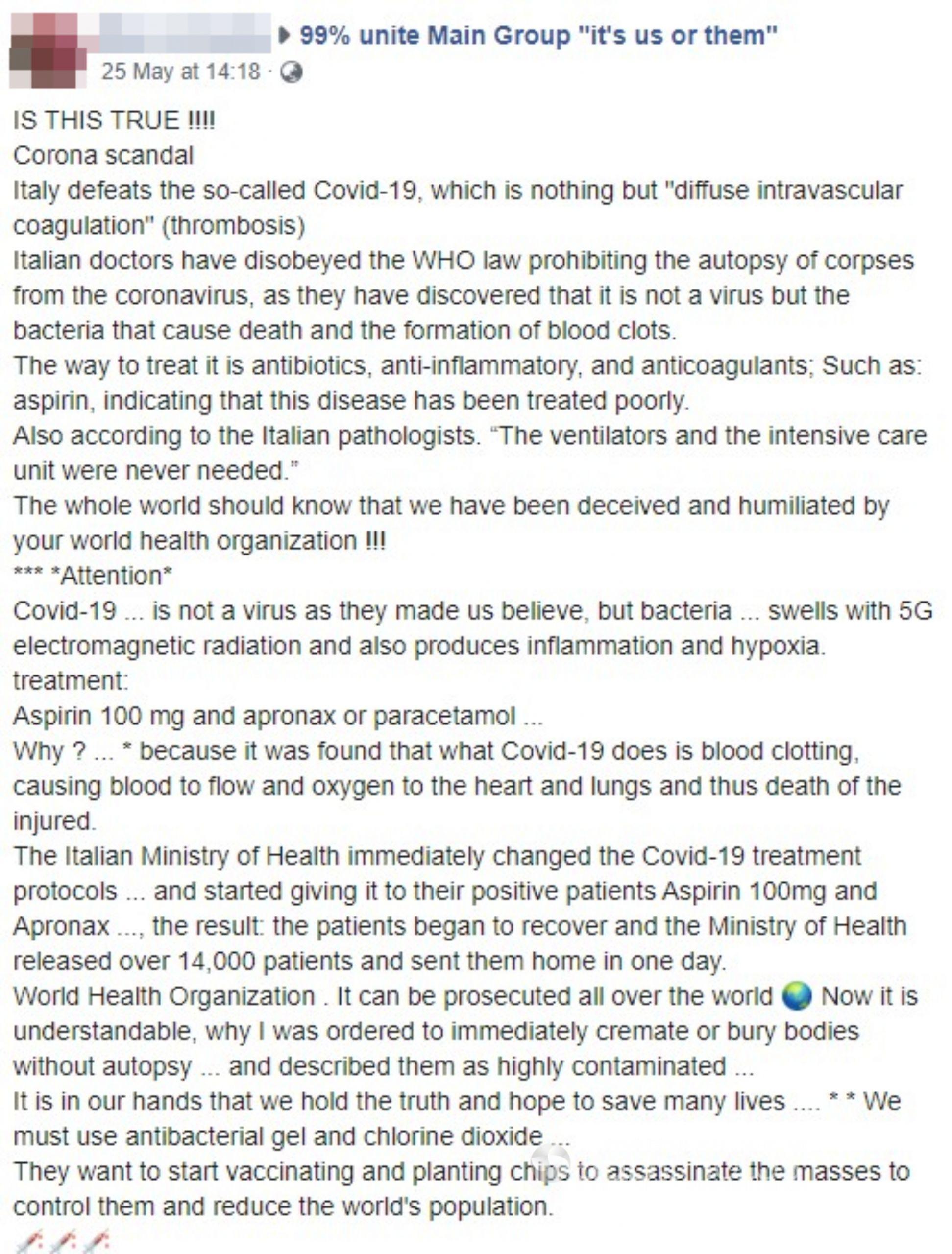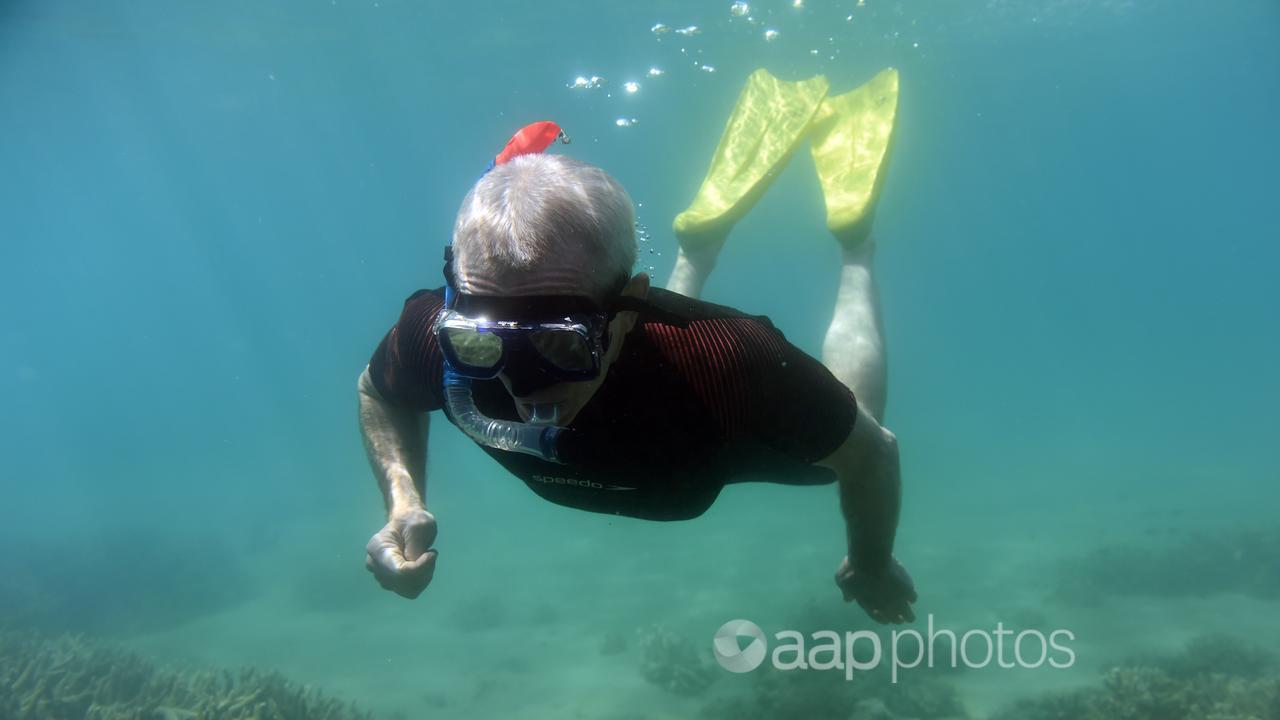The Statement
A widely circulated Facebook post makes a series of claims about Italy “defeating” COVID-19 including that Italian authorities “discovered that it is not a virus, but a bacteria”.
The lengthy post’s main claims are that COVID-19 is “nothing but intravascular coagulation (thrombosis)”.
It also alleges that Italian doctors who performed autopsies “discovered” that COVID-19 “is not a virus” but a bacteria that causes death and the formation of blood clots.
The post claims the treatment for COVID-19 is “antibiotics, anti-inflammatory and anticoagulants such as aspirin” and that Italy’s Health Ministry changed its COVID-19 treatment protocols to give patients “Aspirin 100mg and Apronax”. Apronax is an anti-inflammatory drug.
The Facebook post, which has been shared around the world, including by users in Australia, has attracted 77, 000 views and more than 620 shares.

The Analysis
The Facebook post makes three main claims:
Claim 1: COVID-19 is nothing but “diffuse intravascular coagulation (thrombosis)”.
This claim is false. The Australian Government’s Department of Health describes COVID-19 as “a respiratory illness caused by a new virus“. The World Health Organization lists COVID-19 as an infectious disease caused by a newly discovered coronavirus. Coronaviruses, the WHO says, are a large family of viruses, several of which cause “respiratory infections”. The virus responsible for COVID-19 is severe acute respiratory syndrome coronavirus 2 (SARS-CoV-2).
There have been several studies which found severe COVID-19 cases associated with thrombosis, which is blood clotting inside blood vessels. A study in Ireland found abnormal blood clotting in patients with severe COVID-19 infection. An Italian study observed “thromboembolic events” in 28 out of 388 patients with COVID-19 in intensive care in Milan.
Professor Huyen Tran, a director of the Clinical Thrombosis Centre with the Australian Centre for Blood Diseases, told AAP FactCheck in an email that severe COVID-19 infection “appears to be associated with an increased rate of venous thrombosis”.
Prof Tran said there have also been “sporadic case reports of arterial thrombosis”.
Claim 2: The Facebook post says Italian doctors who performed autopsies discovered that COVID-19 “is not a virus” but a bacteria that causes death and the formation of blood clots.
The claim COVID-19 is “not a virus” is false. The World Health Organization states that it is a “new virus” that was unknown before the outbreak began in Wuhan, China, in December 2019. Italy’s Health Ministry (Ministero della Salute), the Centers for Disease Control and Prevention (CDC) and Johns Hopkins Medicine in the US all list COVID-19 as a newly identified coronavirus.
The claim is contradicted by a preliminary study by Italian pathologists who performed autopsies on 38 victims of COVID-19 in northern Italy. One of the pathologists, Dr Aurelio Sonzogni of Papa Giovanni XXIII Hospital in Bergamo, told fact checkers PolitiFact the study did not change the fact that COVID-19 is a virus that can’t be treated with antibiotics. PolitiFact noted the study had not been peer reviewed for publication in a medical journal.
Claim 3: The post says the way to treat COVID-19 is “antibiotics, anti-inflammatory, and anticoagulants; such as: aspirin”. It claims the Italian Ministry of Health changed its COVID-19 treatment protocols and started giving “Aspirin 100mg and Apronax” to their positive patients.”
Italy’s health ministry website says in a Q & A on treatment for COVID-19 that “there is no specific treatment for the disease caused by the new coronavirus”.
The ministry’s website refers to the Italian Medicines Agency (AIFA) for drugs available to COVID-19 patients. In an AIFA document, titled “Drugs usable for the treatment of COVID-19 disease”, aspirin is not listed. It is also not included on the clinical trials list.
The World Health Organization confirms that antibiotics should not be used in trying to prevent or treat COVID-19. The WHO says there is “no specific medicine recommended to prevent or treat the new coronavirus”.
Prof Tran told AAP FactCheck there is no evidence that aspirin or nonsteroidal anti-inflammatory drugs (NSAIDs), such as Apronax are effective in the treatment of COVID-19.
The Verdict
Based on the evidence, AAP FactCheck found the claims in the post to be false or unsupported by evidence. The claim that COVID-19 is “thrombosis” is false. The World Health Organization (WHO) defines COVID-19 as an infectious respiratory disease caused by a new coronavirus.
The claim COVID-19 is “not a virus” is also false. The WHO, Italy’s Health Ministry, the Centers for Disease Control and Prevention (CDC) and Johns Hopkins Medicine in the US all list the SARS-CoV-2 virus that causes COVID-19 as a newly identified coronavirus.
Regarding the third claim, the World Health Organization says antibiotics should not be used to prevent and treat COVID-19 and Italian health officials say there is no specific treatment for COVID-19. Professor Huyen Tran told AAP FactCheck there was no evidence to show that aspirin or anti-inflammatory drugs were effective COVID-19 treatments.
False – The primary claims of the content are factually inaccurate.
* AAP FactCheck is an accredited member of the International Fact-Checking Network. If you would like to support our independent, fact-based journalism, you can make a contribution to AAP here.
All information, text and images included on the AAP Websites is for personal use only and may not be re-written, copied, re-sold or re-distributed, framed, linked, shared onto social media or otherwise used whether for compensation of any kind or not, unless you have the prior written permission of AAP. For more information, please refer to our standard terms and conditions.


















